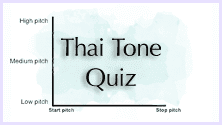Learn Thai Language & Culture with Kruu Jiab
Audio Practice
Slow Pronunciation:
Requested file could not be found (error code 404). Verify the file URL specified in the shortcode.
Fast Pronunciation:
Requested file could not be found (error code 404). Verify the file URL specified in the shortcode.
Very Fast:
Requested file could not be found (error code 404). Verify the file URL specified in the shortcode.
ได้เล่นชิงช้าที่ปาย สนุกและหวาดเสียว
Dâi Lê_n Ching-cháa Têe Bpaai. Sà-nòok Láe’ Wàad~Sĕaw
get to / did/have (past tense) + to play + swing + at/in + Pai. fun + and + thrill/adventurous
= (I) had a go with the swing in Pai. It was fun and thrilling!
Pronunciation Points:
1. Formal situations such as business correspondence, TV host/reporters, etc., Thais usually speak with formal language and with proper pronunciation.
2. Informal situations in everyday life such as speaking with acquaintances, friends and family or even with strangers, Thais usually speak with informal language by shortening the proper/grammatical correct sentences, changing the pronunciation of the letter ร : R (Rolling tongue) to ล : L for example รา : Raa into Laa and omitting the cluster sound in consonant cluster syllables like ประ : Bprà to Bpà.
Culture Points:
The swing you see in the picture originates from the Akha hill tribes (read more)
Akha ( อาข่า : Aa-kàa) hill tribe people have a ceremony called โล้ชิงช้า : Ló Ching-cháa ( โล้ : Ló = to sway, be swayed) around the end of August to the beginning of September to coincide with and celebrate the beginning of the harvesting season, to give thanks to the prosperous goddess, honour femininity, make offerings to the spirits, sharing food and dancing.
More info about the festival click here. (Note the information is in Thai script)
Language Points:
1. Words with many meanings;
– To understand a word that has meaning meanings like the word ที่ : Têe, we look at where it is placed in a sentence and understand the sense (a way in which an expression or a situation can be interpreted) of the word.
2. Feeling verbs and modifiers;
– In Thai, Feeling verbs are immediately used after the subject. e.g. ดีใจ : Dee~Jai = be happy, be delighted, ฉันดีใจ : Chŭn Dee~Jai = I am happy.
– However, some words have two functions as a feeling verb or quality modifier e.g. สนุก : Sà-nòok = feel fun or be fun, ฉันสนุก : Chŭn Sà-nòok = I feel fun. or I am fun.
– To differentiate if one is talking about oneself feeling or oneself quality, we can add the word รู้สึก : Rúu~Sùek meaning to feel in front of the feeling verb e.g ฉันรู้สึกสนุก : Chŭn Rúu~Sùek Sà-nòok
3. Omitting the subject of a sentence;
– Thai basic statement structure is;
Subject + Verb (feeling, action, possession, being, doing/making) + Explanation
Subject + Explanation
and when it is obvious who or what the subject the speaker is talking about, we like to omit it.
For example; It is obvious that speaker omits the word ผม/ฉัน : Pŏ’m/Chŭn meaning I (male)/I (female) or the speakers name in the sentence ได้เล่นชิงช้าที่ปาย : Dâi Lê_n Ching-châa Têe Bpaai meaning (I) had a go with the swing in Pai.
In the sentence, สนุกและหวาดเสียว : Sà-nòok Láe’ Wàad~Sĕaw, the speaker omits the subject word and we can either interpret that the speaker indicates ‘(I) had/felt fun and thrill’ or ‘(It) was fun and thrilling’ as both interpretations portray the message the speaker would like to get across.
Vocabulary:
1. [tense modifier] did/have/have got to (used in front of a verb)
2. [verb] obtain, get/got (used in front of a noun)
3. [possibilitly modifier] can, could, be possible, be able to (used after a statement)
เล่น : Lê_n = [verb] to play
ชิงช้า : Ching-cháa = [noun] swing
ที่ : Têe =
1. [preposition] at/in
2. [noun] place, spot
3. [noun] land, lot, plot of land
4. [noun] a thing/place that is used for ….. (ที่นอน : Têe~Norn = place to sleep, bed)
5. [ordinal number determiner] as in -st, -nd, -rd, -th (ที่หนึ่ง : Têe Nùeng = 1st)
6. [classifier] unit word for places, seat, spot (สองที่ : Sŏrng Têe = 2 units of …, 2 places, 2 seats, 2 spots)
ปาย : Bpaai = [noun] Pai, a district in Mae Hong Son Province located in Northern region of Thailand
สนุก : Sà-nòok = [feeling verb] feel enjoyable, feel fun [modifier] be enjoyable, be fun
และ : Láe’ = [conjunction] and
หวาดเสียว : Wàad~Sĕaw = [feeling verb] feel thrill, feel adventurous [modifier] be thrill, be adventurous
(combined from the word ‘ หวาด : Wàad = [feeling verb] be anxious, be afraid of, be fear (it is usually combined with other words that indicating similar meaning) and ‘ เสียว : Sĕaw‘ = [feeling verb] feel a thrill of fear, feel spasm)
Post By ครูเจี๊ยบ : Kruu Jíab
Follow Kruu Jiab for free Thai language updates here



